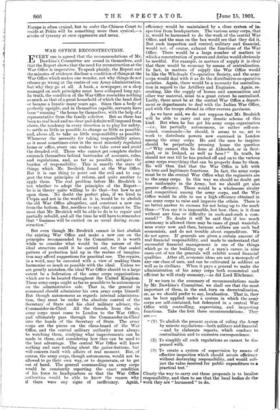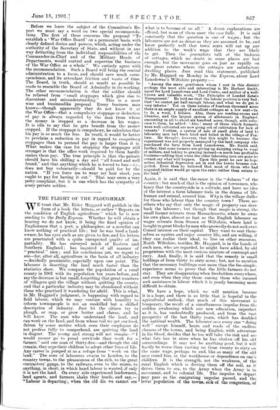WAR OFFICE RECONSTRUCTION. E VERY one is agreed that the recommendations
of Mr. Dawkins's Committee are sound in themselves, and that the Report shows that the need for reconstruction at the War Office is imperative. To speak plainly, the Report and the minutes of evidence disclose a condition of things at the War Office which makes one wonder, not why things do not oftener go wrong at the centre of our Army administration, but why they go at all. A bank, a newspaper, or a shop managed on such principles must have collapsed long ago. In truth, the condition of the War Office resembles nothing so much as that of a great household of which the head died or became a lunatic many years ago. Since then a body of perfectly upright, and in themselves capable, servants, have been " running " the house by themselves, with the help of a representative from the family solicitor. But as there has been no real head and no clear and definitewill imposed from above, the tendency in every direction is to play for safety, to settle as little as possible, to change as little as possible, and, above all, to take as little responsibility as possible. Whenever the necessity for taking responsibility arises, as it must sometimes even in the most minutely regulated home or office, every one rushes to take cover and avoid the dreaded. evil. Those who cannot get complete shelter entrench themselves behind barricades of accounts, rules, and regulations, and, as far as possible, mitigate the burden of responsibility. This is exactly the state of things which Mr. Brodrick found at the War Office. But it is one thing to point out the evil and to sug- gest the true principles of reform, and quite another to apply them. The real problem before Mr. Brodrick is not whether to adopt the principles of the Report— he is in theory quite willing to do that—but how to act upon them. No doubt the perfect plan, if we lived in Utopia and not in the world as it is, would be to abolish the old War Office altogether, and construct a new one from the bottom. But, needless to say, that cannot be. The most that Mr. Brodrick will be able to do is to repair and partially rebuild, and all the time he will have to remember that "business will be carried on as usual during recon- struction."
But even though Mr. Brodrick cannot in fact abolish the existing War Office and make a new one on the principles recommended. by the Committee, it is worth while to consider what would be the nature of the ideal structure could it be carried out, for that sealed pattern of perfection laid up in the realms of imagina- tion may afford suggestions for practical use. The repairs, in a word, may be executed with a view of making them harmonise as much as possible with the ideal. Unless we are greatly mistaken, the ideal War Office should to a large extent be a federation of the army corps organisations which are to be located throughout the United Kingdom.
These army corps ought as far as possible to be autonomous on the administrative side. That is, the general in command should administer his own army corps himself. But though autonomous as regards internal administra- tion, they must be under the absolute control of the Secretary of State and his chief military adviser, the Commander-in-Chief. All the threads from the six army corps must come to London to the War Office, and ultimately pass through the Commander-in-Chief into the hands of the Secretary of State. The army corps are the pieces on the chess-board of the War Office, and the central military authority must always be watching them, studying what improvements can be made in them, and considering how they can be used to the best advantage. The central War Office will know nothing and care nothing about the gaiter-buttons, but will concern itself with affairs of real moment. But, of course, the army corps, though autonomous, would not be allowed to go their own way, or to degenerate, or to get out of hand. The general commanding an army corps would be constantly reporting the exact condition of his force to headquarters so that the War Office authorities would be able to know the reason why if there were any signs of inefficiency. Again, efficiency would be maintained by a close system of in- spection from headquarters. The.various army corps, that is, would be harnessed to do the work of the central War Office, and the man on the box would see that they did it. But such inspection •and control, military and financial, would not, of course, exhaust the functions of the War Office. There would be a large number of matters in which a concentration of powers and duties would obviously be needful. For example, in matters of supply it is clear that there would. be economy by means of centralisation. In fact, in matters of supply the War Office would be like the Wholesale Co-operative Society, and the army corps would deal with it as do the distributive co-operative societies. Again, there would be a necessity for centralisa- tion in regard to the Artillery and Engineers. Again, re- cruiting, like the supply of horses and ammunition and other war material, must to a great extent be centralised. Lastly, there must be at the central War Office a depart- ment or departments to deal with the Indian War Office, and with the troops abroad in other oversew garrisons.
As we have said, we do not suppose that Mr. Brodrick will be able to carry out any drastic scheme of this kind. But when he has got his army corps organisation —i.e., his partially autonomous, or rather self-con- tained, commands—he should, it seems to us, set to work to distribute powers now exercised in London among the army corps. He and the men he inspires should be perpetually pressing home the question —" Why cannot this be done at Aldershot, or in Scot- land, or in Ireland, as well as here ? " In truth, he should not rest till he has pushed off and on to the various army corps everything that can be properly done by them. He will then find that the War Office is left with its true and legitimate functions. In fact, the army corps must be to the central War Office what the regiments are to the army corps. In this way we should no doubt get less uniformity in the Army, but we should get also greater efficiency. There would be a wholesome rivalry and competition among the army corps, and the War Office would be able to use a high efficiency obtained in one army corps to raise and improve the others. There is no better answer to excuses for not being up to the mark than—" You say it is impossible, but how, then, is it done without any fuss or difficulty in such-and-such a com- mand 2 " No doubt it will be said that if too much autonomy is allowed there may be cases of great wasteful- ness every now and then, because soldiers are such bad economists, and do not trouble about expenditure. We do not agree. If generals are given a certain amount of real financial responsibility, and made to understand that successful financial management is one of the things which go to the building up of a man's career, in nine cases out of ten the generals will exhibit sound financial qualities. After all, economic ideas are not a monopoly of any one class of men, and can be cultivated in soldiers as well as in civilians. When it pays a. general to make the administration of his army corps both economical and efficient he will study economy,—as did Lord Kitchener.
If we turn to the summary of recommendations made by Mr. Dawkins's Committee, we shall see that the most important of them, in the end, turn on decentralisation, or, as we should prefer to say, localisation. That is, they can be best applied under a system in which the army corps are self-contained, but federated in a central War Office with controlling, supervising, and .inspecting functions. Take the first three recommendations. They are :— " (1) To abolish the present system of ruling the Array by minute regulations—both military and financial —and by elaborate reports, which conduce to centralisation and to excessive correspondence.
(2) To simplify all such regulations as cannot be dis- pensed with.
To create a system of supervision by means of effective inspection which should secure efficiency without destroying responsibility, and would sub- ject the value received for public expenditure to a practical test."
Clearly the way to carry out these proposals is to localise responsibility, and then to see that the local bodies do the work they are " harnessed " to do. Before we leave the subject of the Committee's Re- port we must say a word on two special recommenda- tions. The first of these concerns the proposal " To establish a' War Office Board' on a permanent basis, with dearly defined duties and powers, which, acting under the authority of the Secretary of State, and without in any way detracting from the individual responsibilities of the Commander-in-Chief and of the Military Heads of Departments, would control and supervise the business of the War Office as a whole" We entirely agree with the recommendation. Such a Board will bring the ()antral administration to a focus, and should save much corre- spondence, and its attendant friction and waste of time. The Board, in truth, should as nearly as possible be made to resemble the Board of Admiralty in its working. The other recommendation is that the soldier should be relieved from " small stoppages which give rise to discontent and misunderstanding." This is a most wise and businesslike proposal. Every business man knows—though apparently they do not know it at the War Office—that a compulsory stoppage or deduction of pay is always regarded by the man from whom the money is stopped as a decrease in his wages. It is idle to say that he gets benefit from the money stopped. If the stoppage is compulsory, he calculates that his pay is so much the less. In truth, it would be better to proclaim a reduction in pay in regard to compulsory stoppages than to pretend the pay is larger than it is. What makes the , case for stopping the stoppages still stronger is that the office work. required by them hardly makes them pay. The true principle is that the private should have his shilling a day and "all found and well found," and that anything which he is forced to buy—i.e.. does not buy voluntarily—should be paid for by the nation. "If you force me to wear my hair short, you ought to pay for having it cut." That may seem a very petty complaint., but it is one which has the sympathy of every private soldier.











































 Previous page
Previous page